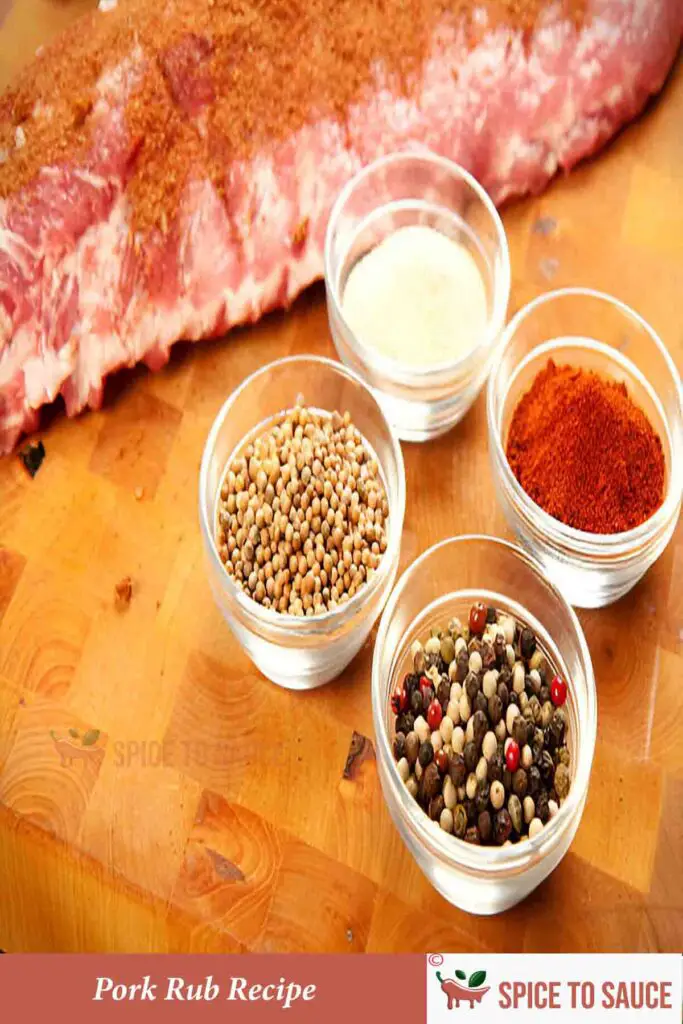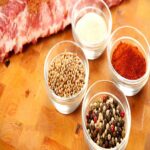Are you looking to add some mouth-watering flavor to your pork dishes? Look no further than this Pork Rub Recipe!
Creating a delicious rub is an art form that can take your pork from ordinary to extraordinary. Today, we will share a tried and true pork rub recipe that will elevate the taste of your pork chops, ribs, or tenderloin. From the perfect blend of spices to the ideal cooking techniques, we’ve got you covered. Get ready to impress your family and friends with a pork dish that’s bursting with flavor!

What Ingredients Are Essential For A Pork Rub?
Creating a flavorful pork rub is all about balancing sweet, savory, and spicy elements. Here are the essential ingredients commonly found in effective pork rub recipes:
Light Brown Sugar 1/2 Cup
Light Brown Sugar is a key ingredient in pork rubs, adding a subtle sweetness that balances the savory and spicy elements. It helps create a caramelized, slightly crispy crust during cooking, enhancing flavor and texture for a perfect finish.
Sweet Paprika 1/4 Cup
Sweet Paprika is essential for a pork rub, offering a mild, smoky flavor and vibrant red color. It adds depth and richness to the rub without overwhelming the meat, balancing other spices while contributing to a well-rounded flavor profile.
Salt 2 Tbsp
Salt is a crucial ingredient in a pork rub, enhancing the natural flavors of the meat. It helps draw out moisture, tenderizes the pork, and balances the sweetness and spiciness of other ingredients, creating a well-seasoned rub.
Chili Powder 1 Tbsp
Chili Powder is a key ingredient in pork rubs, providing a mild heat with a rich, smoky flavor. It often combines dried chili peppers, garlic, and other spices, contributing complexity and depth to the overall taste of the pork.
Onion Powder 1 Tbsp
Onion Powder adds a savory, slightly sweet flavor to a pork rub. It enhances the overall taste profile by providing depth and richness, complementing other spices, and creating a well-balanced, flavorful crust on the pork when cooked.
Garlic Powder 1 Tbsp
Garlic Powder imparts a robust, savory flavor, elevating the taste of the pork and complementing other spices in the rub.
Pepper 1 Tbsp
Black Pepper adds a sharp, mildly spicy kick, balancing sweetness and enhancing the overall flavor complexity of the pork rub.
Mustard Powder 1 Tbsp
Mustard Powder adds a tangy, slightly spicy kick to a pork rub. It helps balance the sweetness and enhances the overall flavor profile. Its mild heat also contributes to a deeper, more complex seasoning that complements the pork perfectly.
Cumin 2 Tsp
Cumin adds a warm, earthy, and slightly nutty flavor to a pork rub. It enhances the depth of the seasoning, providing a rich, savory base that complements the sweetness and spiciness of other ingredients, creating a well-rounded flavor profile.
Cayenne Pepper 1 Tsp
Cayenne Pepper provides a bold, fiery heat to a pork rub, enhancing the spiciness without overpowering the other flavors. It adds depth and a sharp kick, perfect for those who enjoy a bit of extra heat in their seasoning.
Essential Equipments For Pork Rub
To make a flavorful pork rub, these essential tools are needed:
- Mixing Bowls: To combine all your dry ingredients evenly.
- Measuring Spoons: For precise measurements of spices.
- Mortar and Pestle: To crush and grind spices for a fresher flavor.
- Whisk: To mix ingredients thoroughly, especially when incorporating liquids.
- Storage Container: For keeping the rub fresh and airtight for future use.
These tools ensure you create a well-balanced and flavorful rub, enhancing the taste of your pork dishes.
How to Make the Best Pork Rub at Home?
- Combine all ingredients and stir until thoroughly combined.
- Store in an airtight jar for up to 2-3 months.
How Long Should Pork Sit With A Dry Rub?
For the best flavor, pork should sit with a dry rub for at least 30 minutes to an hour before cooking. This allows the rub to penetrate the meat and infuse flavor. However, for deeper flavor, it’s ideal to let it sit for 4 to 24 hours in the refrigerator. The longer it rests, the more time the spices have to work into the meat. Just be sure to cover it with plastic wrap or foil while refrigerating. Avoid rubbing too long if the rub contains sugar, as it may burn during cooking.

Pork Rub Recipe
Ingredients
- ½ Cup Light Brown Sugar
- ¼ Cup Sweet Paprika
- 2 Tbsp Salt
- 1 Tbsp Chili Powder
- 1 Tbsp Onion Powder
- 1 Tbsp Garlic Powder
- 1 Tbsp Pepper
- 1 Tbsp Mustard Powder
- 2 Tsp Cumin
- 1 Tsp Cayenne Pepper
Instructions
- Combine all ingredients and stir until thoroughly combined
- Store in an airtight jar for up to 2-3 months
Nutrition
Final Words
Perfect homemade pork rub will help your pork meals to be the next best thing. This rub’s mix of spices and seasonings will improve the taste of your pork, so tantalizing your taste receptors. This handmade rub will wow your family and friends whether your hog is smoking, roasting, or grilling. Try this homemade pork rub recipe today and be ready to enjoy every morsel of well seasoned meat!
FAQs
Can Pork Rub Be Used for Chicken or Beef?
Yes, pork rub can be used for chicken or beef, as the flavors in the rub often complement a variety of meats. However, since pork has a distinct flavor, you might want to adjust the seasoning based on the meat. For chicken, you might reduce the amount of sugar, as it can burn easily. For beef, consider adding stronger spices like smoked paprika or black pepper to enhance the flavor profile.
Sweet vs. Spicy Pork Rub: What’s the Difference?
The main difference between sweet and spicy pork rubs lies in their flavor profiles. Sweet rubs typically include ingredients like brown sugar, honey, or maple, creating a caramelized crust and balancing savory flavors. Spicy rubs, on the other hand, focus on heat, using ingredients like cayenne pepper, chili powder, and paprika to provide a bold kick. You can also combine both for a sweet and spicy blend, offering a balanced flavor with sweetness followed by a spicy kick.




